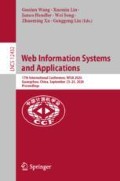Abstract
In recent years, medical Question Answering (QA) systems have gained a lot of attentions, since they can not only help professionals make quick decisions, but also give ordinary people advice when they seek for helpful information. However, the interpretability and accuracy problems have plagued QA systems for a long time. In this paper, we propose a QA system, DSQA, based on knowledge graph for answering domain-specific medical questions. The data we use are from Electronic Medical Records (EMRs) that are complex and heterogeneous with varied qualities. We introduce doctor-in-the-loop mechanism to design the knowledge graph, which improves the interpretability and the accuracy of our QA system. For every natural-language question, we generate the answer with a hybrid of the traditional deep learning model and the reasoning on the knowledge graph. Finally, the answer is returned to the user in the format of a subgraph with corresponding natural-language sentences. Our system shows high interpretability and gives excellent performance according to the experiment results.
Access this chapter
Tax calculation will be finalised at checkout
Purchases are for personal use only
References
Alqifari, R.: Question answering systems approaches and challenges. In: Student Research Workshop, pp. 69–75 (2019). https://doi.org/10.26615/issn.2603-2821.2019_011
Ansong, S., Eteffa, K.F., Li, C., Sheng, M., Zhang, Y., Xing, C.: How to empower disease diagnosis in a medical education system using knowledge graph. In: Ni, W., Wang, X., Song, W., Li, Y. (eds.) WISA 2019. LNCS, vol. 11817, pp. 518–523. Springer, Cham (2019). https://doi.org/10.1007/978-3-030-30952-7_52
Ao, X., Shi, H., Wang, J., Zuo, L., Li, H., He, Q.: Large-scale frequent episode mining from complex event sequences with hierarchies. ACM TIST 10(4), 36:1–36:26 (2019). https://doi.org/10.1145/3326163
Bao, Q., Ni, L., Liu, J.: HHH: an online medical chatbot system based on knowledge graph and hierarchical bi-directional attention. In: Proceedings of the Australasian Computer Science Week Multiconference, pp. 1–10 (2020). https://doi.org/10.1145/3373017.3373049
He, J., Fu, M., Tu, M.: Applying deep matching networks to chinese medical question answering: a study and a dataset. BMC Med. Inform. Decis. Mak. 19(2), 52 (2019). https://doi.org/10.1186/s12911-019-0761-8
Huang, X., Zhang, J., Li, D., Li, P.: Knowledge graph embedding based question answering. In: WSDM, pp. 105–113 (2019). https://doi.org/10.1145/3289600.3290956
Li, C., Hang, S., Chu, D., Zheng, H., Hu, X.: Knowhealth: a knowledge graph based question-answer platform for elderly people. In: EAI (2019). https://doi.org/10.4108/eai.29-6-2019.2282866
Li, M., Huang, M., Zhang, Y., Feng, W.: A DIK-based question-answering architecture with multi-sources data for medical self-service (S). In: Perkusich, A. (ed.) SEKE, pp. 1–10 (2019). https://doi.org/10.18293/SEKE2019-112
Liu, H., Hu, Q., Zhang, Y., Xing, C., Sheng, M.: A knowledge-based health question answering system. In: Chen, H., Zeng, D.D., Karahanna, E., Bardhan, I. (eds.) ICSH 2017. LNCS, vol. 10347, pp. 286–291. Springer, Cham (2017). https://doi.org/10.1007/978-3-319-67964-8_29
Lukovnikov, D., Fischer, A., Lehmann, J., Auer, S.: Neural network-based question answering over knowledge graphs on word and character level. In: WWW, pp. 1211–1220 (2017). https://doi.org/10.1145/3038912.3052675
Pampari, A., Raghavan, P., Liang, J., Peng, J.: emrQA: a large corpus for question answering on electronic medical records. arXiv preprint arXiv:1809.00732 (2018). https://doi.org/10.18653/v1/d18-1258
Ruan, T., Huang, Y., Liu, X., Xia, Y., Gao, J.: Qanalysis: a question-answer driven analytic tool on knowledge graphs for leveraging electronic medical records for clinical research. BMC Med. Inform. Decis. Mak. 19(1), 82 (2019). https://doi.org/10.1186/s12911-019-0798-8
Saha, A., Pahuja, V., Khapra, M.M., Sankaranarayanan, K., Chandar, S.: Complex sequential question answering: towards learning to converse over linked question answer pairs with a knowledge graph. In: AAAI (2018)
Sheng, M., et al.: DEKGB: an extensible framework for health knowledge graph. In: Chen, H., Zeng, D., Yan, X., Xing, C. (eds.) ICSH 2019. LNCS, vol. 11924, pp. 27–38. Springer, Cham (2019). https://doi.org/10.1007/978-3-030-34482-5_3
Tian, Y., Ma, W., Xia, F., Song, Y.: Chimed: a Chinese medical corpus for question answering. In: BioNLP Workshop and Shared Task, pp. 250–260 (2019). https://doi.org/10.18653/v1/w19-5027
Wu, J., Zhang, Y., Wang, J., Lin, C., Fu, Y., Xing, C.: Scalable metric similarity join using mapreduce. In: ICDE, pp. 1662–1665 (2019). https://doi.org/10.1109/ICDE.2019.00167
Zhang, M., Tian, G., Zhang, Y.: A home service-oriented question answering system with high accuracy and stability. IEEE Access 7, 22988–22999 (2019). https://doi.org/10.1109/ACCESS.2019.2894438
Zhao, K., et al.: Discovering subsequence patterns for next POI recommendation. In: IJCAI, pp. 3216–3222 (2020). https://doi.org/10.24963/ijcai.2020/445
Zheng, W., Cheng, H., Zou, L., Yu, J.X., Zhao, K.: Natural language question/answering: let users talk with the knowledge graph. In: CIKM, pp. 217–226 (2017). https://doi.org/10.1145/3132847.3132977
Acknowledgments
This work was supported by NSFC (91646202), National Key R&D Program of China (2018YFB1404401, 2018YFB1402701).
Author information
Authors and Affiliations
Corresponding author
Editor information
Editors and Affiliations
Rights and permissions
Copyright information
© 2020 Springer Nature Switzerland AG
About this paper
Cite this paper
Sheng, M. et al. (2020). DSQA: A Domain Specific QA System for Smart Health Based on Knowledge Graph. In: Wang, G., Lin, X., Hendler, J., Song, W., Xu, Z., Liu, G. (eds) Web Information Systems and Applications. WISA 2020. Lecture Notes in Computer Science(), vol 12432. Springer, Cham. https://doi.org/10.1007/978-3-030-60029-7_20
Download citation
DOI: https://doi.org/10.1007/978-3-030-60029-7_20
Published:
Publisher Name: Springer, Cham
Print ISBN: 978-3-030-60028-0
Online ISBN: 978-3-030-60029-7
eBook Packages: Computer ScienceComputer Science (R0)


